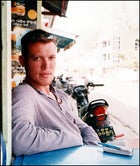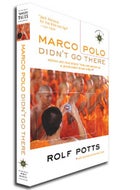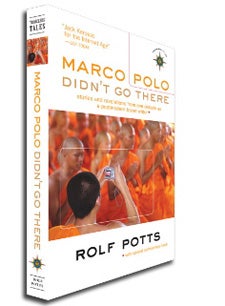Rolf Potts has seen the worldall of it. The 38-year-old writer and adventurer shares his travels in Marco Polo Didn’t Go There: Stories and Revelations from One Decade as a Postmodern Travel Writer (Travelers’ Tales) a recently published collection of his best stories, which includes a 2006 feature from ���ϳԹ��� Traveler that won a prestigious Lowell Thomas award. We caught up with the Kansas native in Montreal to get the lowdown on the life of a true vagabond:
Rolf Potts
 Potts takes a break
Potts takes a breakMarco Polo Didn't Go There

What was your biggest revelation as a “postmodern travel writer?”
A generation ago travel writing was an extractive task, a one-way communication that tended to exoticize far-off places. It’s harder to do that these days, since the guy you write about in, say, Ethiopia can read what you’ve written and disagree with you.
What’s your definition of an adventure traveler?
There’s one chapter in my book, “Death of an ���ϳԹ���,” where I discover that the Burmese émigré who cut my hair in Thailand is probably the greatest adventure traveler I’ve ever met. His adventures weren’t the stuff of climbing tall mountains and securing corporate sponsorships, but fighting wars and smuggling tin so he could feed his family.
Bust open the myths of travel writing:
The myths around travel writing tend to skew to a couple of extremes. On one extreme you have the myth of the permanent vacation, where the travel writer lives this continuously leisured life, flitting around the world and occasionally dashing off prose about how exotic and adventurous everything is. On the other extreme is the myth of the travel writer as the ultimate hack, this mouth-breathing slave to the travel-PR industry, who is always shuffling along on press trips and writing what amounts to ad copy.
The reality is a lot more complicated. Sure, there can be a degree of leisure to the job, and (as I point out in my book) there sometimes a challenge to stay independent from the pressures of the travel industry, but the truth is that most serious travel writers spend an inordinate amount of time writing. For every hour we spend someplace exotic, we spend five hours in someplace unexotic, doing research and laboring over the prose.
Who is the best travel writer of all time?
Mark Twain, simply because — in books like The Innocents Abroad — he made no pretense to be some sort of rugged, solitary adventurer. His adventures took place, for the most part, in that same tourist matrix we all inhabit to this day. And the wicked humor and insight with which he examined the tourist experience can still teach us things about how we travel. Too often, in trying to pretend our travels somehow exist outside of tourism, we miss the true dynamic of how the travel experienceand the worldworks. This is a dynamic I continually try to capture in my new book. “Tourism” need not be seen as a pejorative word; it’s just an aspect of how we all travel these days.
What has been your best adventure?
In 1999 I bought a 30-foot Lao fishing boat with a couple American friends in Luang Prabang and took it 900 miles down the Laotian Mekong over the course of three weeks. Every day of that journey was an amazing challenge, and I remember it well. But that story didn’t make the cut in my book. Sometimes misadventures make better reading than adventures so instead of the Mekong adventure my new book has stranger tales, like the time I ran out of water in the Libyan desert, or the time I watched bad porn with Hindu drunks in the remote Himalayas, or the time tried to infiltrate the set of a Leonardo DiCaprio movie in Thailand.
For more on Rolf Potts go to
For more on Stephanie Pearson go to


